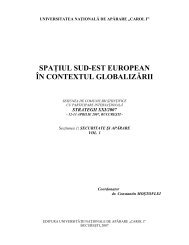Impact strategic nr.6-7 - Centrul de Studii Strategice de Apărare şi ...
Impact strategic nr.6-7 - Centrul de Studii Strategice de Apărare şi ...
Impact strategic nr.6-7 - Centrul de Studii Strategice de Apărare şi ...
- No tags were found...
You also want an ePaper? Increase the reach of your titles
YUMPU automatically turns print PDFs into web optimized ePapers that Google loves.
AGENDA NATO<br />
Alături <strong>de</strong> aceste aspecte, se poate vorbi <strong>şi</strong> <strong>de</strong> modificări<br />
conceptuale la nivelul luptei antiteroriste <strong>şi</strong> contrateroriste<br />
pe plan local <strong>şi</strong> regional, <strong>de</strong>spre credinţa privind o conjugare<br />
tot mai accentuată între terorism <strong>şi</strong> criminalitatea<br />
organizată, <strong>de</strong>spre modificări conceptuale <strong>şi</strong> practice ale<br />
relaţiilor civil-militare, <strong>de</strong>spre accentul tot mai insistent<br />
pus pe combaterea corupţiei, ca <strong>şi</strong> <strong>de</strong>spre reducerea personalului<br />
din forţele armate ale ţărilor invitate la a<strong>de</strong>rare,<br />
prin profesionalizarea armatei.<br />
NOTE<br />
1<br />
Gl. Bg. Dr. Ing. Sergiu Medar, Ameninţările asimetrice <strong>şi</strong> securitatea globală, în Revista <strong>de</strong> ştiinţe militare, anul II, 2002, nr. 1 (2),<br />
Bucureşti, p. 27.<br />
2<br />
George Robertson, Discurs la Conferinţa pe probleme <strong>de</strong> Politici <strong>de</strong> Securitate, München, 08.02.2003<br />
3<br />
v. cotidianul A<strong>de</strong>vărul, 08.10.2001.<br />
4<br />
Gl. Bg. Dr. Ing. Sergiu Medar, op. cit., p. 27.<br />
5<br />
Janowitz, Morris, Organizarea militară în societăţile industriale, în Armata <strong>şi</strong> societatea, Editura INFO-TEAM, Bucureşti 1998, p. 71.<br />
6<br />
http://proquest.umi.com/pqdweb?Did=000000135393051&Fmt=4&Deli=1&Mtd=2&Idx=9 (15.10.2002)<br />
7<br />
http://proquest.umi.com/pqdweb?Did=000000159473131&Fmt=3&Deli=1&Mtd=2&Idx=2 (15.10.2002)<br />
8<br />
v. cotidianul Curierul Naţional din 05.10.2002.<br />
The terrorist attacks on the eleventh of September 2001 have <strong>de</strong>termined NATO to re<strong>de</strong>fine its priorities. These changes in strategy<br />
rely on <strong>de</strong>eper changes in the Organization‘s conceptual core. Among these changes we can mention giving up the concepts of “zeroown-casualties”,<br />
“collateral casualties” or “peaceful conflict prevention and/or management”.<br />
Moreover, concepts like “constabulary forces” or “security through cooperation with external partners” (see the cooperation between<br />
NATO and The Russian Fe<strong>de</strong>ration within the recently created “NATO-Russia Council”) tend to replace ol<strong>de</strong>r concepts which represent<br />
an inheritance of the Cold War era. Also, the concept of “preventive war” represents a new way of <strong>de</strong>aling with the new asymmetric<br />
threats.<br />
Another conceptual change, which tends to become a very important change in NATO‘s “<strong>strategic</strong> behavior”, is the assumption<br />
that each participating country in the Alliance‘s missions should participate with specialized forces (different specialization for each of<br />
the NATO members). And, given the fact that in war-related missions the United States are used to be the lea<strong>de</strong>rs and initiate NATO<br />
peace-making missions, through war-related means, we may assume that the new Alliance‘s members will be assigned especially<br />
constabulary missions.<br />
Amongst the practical consequences of these conceptual changes we may also mention the increasing role of Intelligence cooperation,<br />
special forces, informational war and internal security forces, as well as the increasing attention paid and the increasing efforts to<br />
fight against international and national organized crime, consi<strong>de</strong>red nowadays as a phenomenon stronger and stronger connected to<br />
terrorism.<br />
Of a tantamount importance are, of course, the conceptual changes in anti-terrorist and counter-terrorist strategies and tactics, the<br />
increasing cooperation between terrorist organizations and organized crime networks, the re-evaluation of civil-military relations, the<br />
IMPACT STRATEGIC nr. 1-2/2003<br />
203



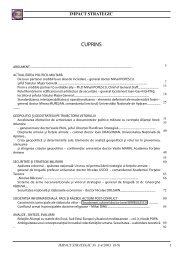

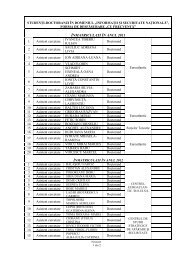
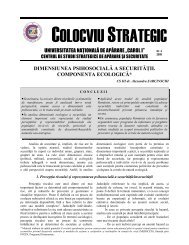
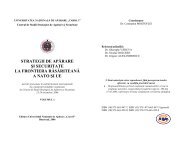
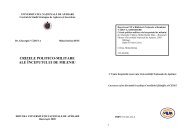


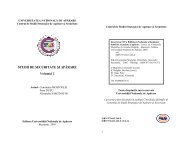
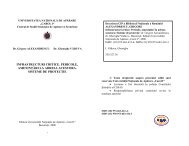
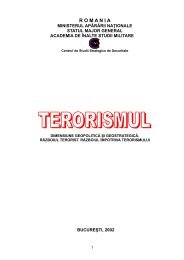
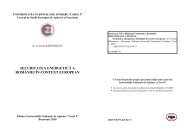
![„CAROL Nr 4 [29]/2008](https://img.yumpu.com/53801719/1/184x260/carol-nr-4-29-2008.jpg?quality=85)
